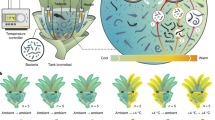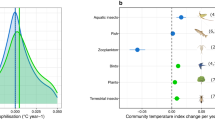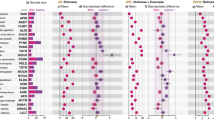Abstract
Climate change is now considered to be the greatest threat to biodiversity and ecological networks, but its impacts on the bacterial communities associated with plants and animals remain largely unknown. Here, we studied the consequences of climate warming on the gut bacterial communities of an ectotherm, the common lizard (Zootoca vivipara), using a semi-natural experimental approach. We found that 2–3 °C warmer climates cause a 34% loss of populations’ microbiota diversity, with possible negative consequences for host survival.
This is a preview of subscription content, access via your institution
Access options
Access Nature and 54 other Nature Portfolio journals
Get Nature+, our best-value online-access subscription
$29.99 / 30 days
cancel any time
Subscribe to this journal
Receive 12 digital issues and online access to articles
$119.00 per year
only $9.92 per issue
Buy this article
- Purchase on Springer Link
- Instant access to full article PDF
Prices may be subject to local taxes which are calculated during checkout

Similar content being viewed by others
References
Singer, A., Travis, J. M. J. & Johst, K. Oikos 122, 358–366 (2013).
Parmesan, C. Annu. Rev. Ecol. Evol. Syst. 37, 637–669 (2006).
Bestion, E., Teyssier, A., Richard, M., Clobert, J. & Cote, J. PLoS Biol. 13, e1002281 (2015).
Dunn, R. R., Harris, N. C., Colwell, R. K., Koh, L. P. & Sodhi, N. S. Proc. Biol. Sci. 276, 3037–3045 (2009).
Gilbert, S. F., Sapp, J. & Tauber, A. I. Q. Rev. Biol. 87, 325–341 (2012).
Ruiz-Rodríguez, M. et al. J. Avian Biol. 40, 42–48 (2009).
Carey, H. V., Walters, W. A. & Knight, R. Am. J. Physiol. Regul. Integr. Comp. Physiol. 304, R33–R42 (2013).
Sullam, K. E. et al. Mol. Ecol. 21, 3363–3378 (2012).
Lurgi, M., López, B. C. & Montoya, J. M. Phil. Trans. R. Soc. B 367, 3050–3057 (2012).
White, J., Richard, M., Massot, M. & Meylan, S. PLoS ONE 6, e22339 (2011).
Bolnick, D. I. et al. Ecol. Lett. 17, 979–987 (2014).
Sison-Mangus, M. P., Mushegian, A. A. & Ebert, D. ISME J. 9, 59–67 (2015).
Turnbaugh, P. J. et al. Nature 449, 804–810 (2007).
Kim, B.-J., Lee, S.-Y., Kim, H.-B., Lee, E. & Hong, S.-J. Allergy Asthma Immunol. Res. 6, 389–400 (2014).
Altizer, S., Ostfeld, R. S., Johnson, P. T. J., Kutz, S. & Harvell, C. D. Science 341, 514–519 (2013).
IPCC Climate Change 2013: The Physical Science Basis (eds Stocker, T. F. et al.) (Cambridge Univ. Press, 2013).
Kohl, K. D. & Yahn, J. Environ. Microbiol. 18, 1561–1565 (2016).
Dillon, M. E., Wang, G. & Huey, R. B. Nature 467, 704–706 (2010).
Le Chatelier, E. et al. Nature 500, 541–546 (2013).
Mandrioli, M. Invertebrate Surviv. J. 9, 58–63 (2012).
Kikuchi, Y. et al. mBio 7, e01578-16 (2016).
Kohl, K. D. et al. Mol. Ecol. 26, 1175–1189 (2017).
Colston, T. J., Noonan, B. P. & Jackson, C. R. PLoS ONE 10, e0128793 (2015).
Lozupone, C. A., Stombaugh, J. I., Gordon, J. I., Jansson, J. K. & Knight, R. Nature 489, 220–230 (2012).
Acknowledgements
We thank A. Cave, B. Rémurier, L. Geidel and A. Fournier for fieldwork assistance, H. Holota for performing genetic extractions, and J. Chave and G. Yvon-Durocher for their helpful comments on the manuscript. We are also grateful to the genotoul bioinformatics platform Toulouse Midi-Pyrenees (Bioinfo Genotoul) for providing computing and storage resources. This work was carried out at the Station d’Ecologie Theorique et Experimentale (Centre National de la Recherche Scientifique (CNRS) UMR 5321) and the Laboratoire Evolution et Diversité Biologique (CNRS, Université Paul Sabatier, Ecole Nationale Supérieure de Formation de l’Enseignement Agricole (ENSFEA), UMR 5174), and was supported by the Laboratoires d’Excellence TULIP (ANR-10-LABX-41) and CEBA (ANR-10-LABX-25-01). J.C. was supported by an ANR-12-JSV7-0004-01, and J.W. by an AOI Fonds Scientifique – ENSFEA. This work was supported by an ‘Investissements d'avenir’ programme from the Agence Nationale de la recherche number ANR-11-INBS-0001AnaEE-Services.
Author information
Authors and Affiliations
Contributions
E.B., J.W. and J.C. designed the study. E.B. and J.C. performed the experiments. E.B. collected genetic data, L.D.G. and J.W. extracted microbial genetic data, and M.R. extracted and analysed lizard genetic data. S.J., J.W. and L.Z. performed molecular and bioinformatics analyses, and E.B., J.C., L.D.G. and S.J. analysed the data. E.B. wrote the first draft, and J.C., J.W., S.J. and L.Z. contributed significantly to the writing of the manuscript.
Corresponding author
Ethics declarations
Competing interests
The authors declare no competing financial interests.
Supplementary information
Supplementary Information
Supplementary Methods, Supplementary Results, Supplementary References, Supplementary Figures 1–5, Supplementary Tables 1–20. (PDF 1068 kb)
Rights and permissions
About this article
Cite this article
Bestion, E., Jacob, S., Zinger, L. et al. Climate warming reduces gut microbiota diversity in a vertebrate ectotherm. Nat Ecol Evol 1, 0161 (2017). https://doi.org/10.1038/s41559-017-0161
Received:
Accepted:
Published:
DOI: https://doi.org/10.1038/s41559-017-0161
This article is cited by
-
Gut microbiota modulation enhances the immune capacity of lizards under climate warming
Microbiome (2024)
-
Effects of heat tolerance on the gut microbiota of Sarcophaga peregrina (Diptera: Sarcophagidae) and impacts on the life history traits
Parasites & Vectors (2023)
-
Fine-scale spatial variation shape fecal microbiome diversity and composition in black-tailed prairie dogs (Cynomys ludovicianus)
BMC Microbiology (2023)
-
Host-Specific Differences in Gut Microbiota Between Cricetulus barabensis and Phodopus sungorus
Current Microbiology (2023)
-
Captivity and Animal Microbiomes: Potential Roles of Microbiota for Influencing Animal Conservation
Microbial Ecology (2023)



